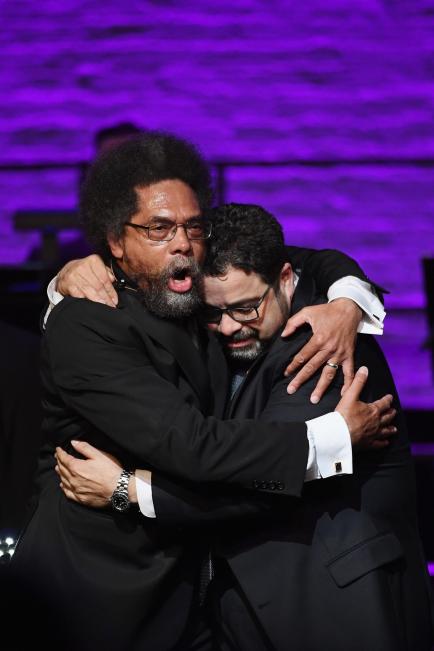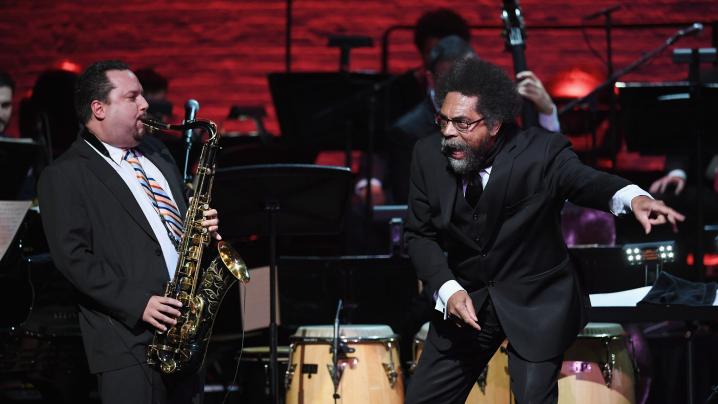[ad_1]

Cornel West (right) performs in the show Jazz and Spirit at the Apollo Theater in Harlem May 21, 2016.
Shahar Azran
In this day and age, there is little reward in seeking the truth, and less profit in sharing that truth once you have found it. So it’s remarkable that a program like Jazz and Spirit could ever come together, much less on a world-renowned stage like Harlem’s Apollo Theater. On Saturday, a great philosopher in Cornel West and a great musician in Arturo O’Farrill came together on that stage to explore how spoken word and Afro-Latin jazz can combine to still the troubled waters of an age where commercialism rules and populism has emerged once again as a respectable part of the political landscape.
O’Farrill was inspired by what he called the innate musicality of West’s words when he heard him speak at a rally several years ago.
“I heard music, I heard notes, I heard an incredible, profound joy,” O’Farrill told The Root in an interview he gave along with West. “I wanted to capture some of that because words are important, but music has a way of sometimes transcending words, and so I asked Dr. West if I could write a concerto for him and he trusted me with this.”
West is a veteran of spoken word having created several albums in collaboration with artists like Prince and André 3000. But even for West, this was new territory.
“It’s profoundly humbling,” West said about participating in this fusion. “You have to learn, you have to listen, you have to adjust, you have to adapt, you have to be flexible.” And for the two artists, it was about far more than making music.
“We are both fundamentally committed to truth,” West continued. “We’ve got to keep track of the ubiquitous mendacity that we see in the culture at every level from the music to the White House, from the religious institutions to the civic ones.”

Cornel West and musician Arturo O’Farrill embrace during the Jazz and Spirit show at the Apollo Theater in Harlem May 21, 2016.
Shahar Azran
The music and the words spoken from the stage pulled no punches and spoke directly to the crisis our society is facing. Joined by the Afro-Latin Jazz Orchestra, O’Farrill filled the Apollo with a big-band sound so potent, at times it seemed as if the walls would be unable to contain it. (Full disclosure: The partner of this writer sits on the board of the Afro-Latin Jazz Alliance, the orchestra’s parent organization).
The evening began with “A Still, Small Voice,” a piece written by O’Farrill in response to the speculative mortgage crisis that begat the Great Recession. Echoing the pain and suffering that hundreds of thousands of Americans experienced as a result of the avarice of unchecked capitalism, the orchestra touched the scar that still aches in our society. The orchestra was joined onstage by a choir that gave voice to that suffering and made it real.
As he introduced “A Wise Latina,” O’Farrill told the audience that “the fulcrum of social justice is spiritual.” Noting that one does not need to believe in God to be spiritual, he explained that the search for equality is deeply spiritual in nature and the music he wrote celebrated not just a noted jurist, but the hope that the institutions of our society, especially those concerned with the application of justice, will increasingly reflect the diversity that is America.
By the time West took the stage for the concerto named after him, the audience was more than ready to hear his truths. Part sermon, part improvisational jazz concert, West explored a few of the seminal questions NAACP founder W.E.B. Du Bois posed nearly a century ago as the orchestra echoed and explored the melody and rhythms of his cadences. The piece was commissioned by the Apollo as part of its 2015-2016 season and was a wonderful example of why nonprofit institutions must continue to play a leadership role in the arts as it is difficult to imagine such a work coming into existence any other way.
“What does decency do in the face of insult? … How shall honesty face deception?” West asked the audience. While his questions did not find answers, he brought listeners on the first steps of how to begin answering them. During the performance, West stalked the stage, dueling with first, a trombonist, and then a conga player who approached him; West’s words intertwining with their music. He embraced the pianist even as he riffed, and all the while, he never abandoned those who filled the legendary house.
“Tenderness is what justice looks like in private just like justice is what love looks like in public,” he half-shouted/half-whispered at one point. To see one of America’s great orators work hand in glove with one of America’s great composers and musicians was a sight to behold.
And even then there was more to come as O’Farrill ended the evening with two compositions. The first, “Trump, Un-Trump” was a beautiful musical insult, if such a thing exists, and expressed the collective disbelief and sadness many in America feel at the emergence of The Donald as the leader of half of the American political duopoly.
“We must fight tirelessly to reveal the mediocrity that he is,” the composer exhorted from the stage.
The evening’s final piece, “40 Acres and a Burro,” was both an exploration of the deep, shared history of the black and Latino communities, as well as a meditation on the marginalization these communities still face.
Great art can come out of pain, and if there is a silver lining to the struggles that people of color in America must endure, it is that artists like West and O’Farrill can not only be inspired by their fight and search for the truth, but they can combine forces and by doing so become even more powerful.
Born and raised in Brooklyn, N.Y., Damaso Reyes has been a journalist for over 15 years. His projects have taken him to Rwanda, Indonesia, Tanzania and throughout the United States and Europe. Reyes is also a Fulbright scholar and a senior fellow at the World Policy Institute, focusing on migration. He is the principal photographer of The Europeans, a documentary project examining the changes that Europe and its people are experiencing.
Like The Root on Facebook. Follow us on Twitter.
[ad_2]





















